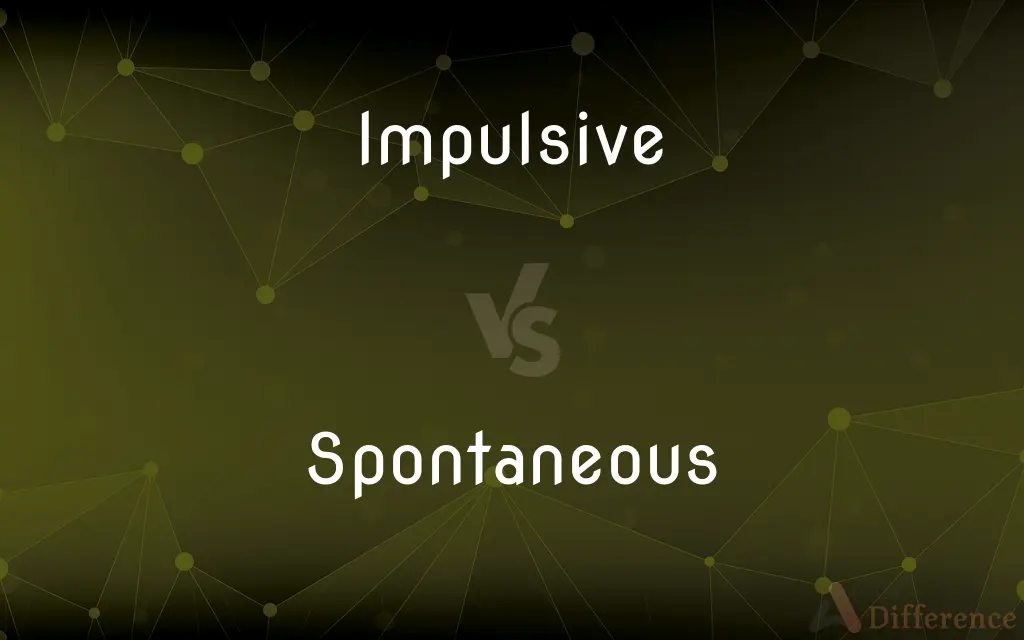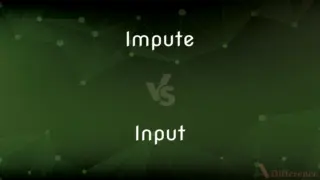Impulsive vs. Spontaneous — What's the Difference?
By Tayyaba Rehman & Fiza Rafique — Updated on April 29, 2024
Impulsive actions are driven by sudden desires without much forethought, whereas spontaneous actions, though also unplanned, often carry a more positive connotation of freedom and creativity.

Difference Between Impulsive and Spontaneous
Table of Contents
ADVERTISEMENT
Key Differences
Impulsive behavior typically implies a lack of control and is often seen in responses to immediate emotions, whereas spontaneous behavior, although also unplanned, is usually viewed more positively as it suggests a natural and unforced reaction to circumstances.
Impulsivity can lead to regrettable decisions due to its rash nature, while spontaneity can enhance experiences by adding elements of surprise and joy without the negative repercussions associated with impulsiveness.
In psychological terms, impulsivity is often considered a personality trait that can have detrimental effects on one’s life, such as financial problems or relationship issues, whereas spontaneity is generally associated with adaptability and creativity.
Impulsive actions can be perceived as irresponsible or reckless, while spontaneous actions are often celebrated as expressions of authenticity and genuine emotion.
Impulsiveness can be frowned upon as it may disrupt social norms or expectations, whereas spontaneity is often embraced in many cultures that value flexibility and the ability to adapt to changing situations.
ADVERTISEMENT
Comparison Chart
Definition
Acting without forethought, driven by emotions
Acting without pre-planning, driven by the moment
Connotation
Generally negative
Generally positive
Social Perception
Reckless, irresponsible
Authentic, lively
Impact on Decisions
Often leads to regret
Often leads to enjoyable surprises
Related Traits
Lack of self-control, rash
Adaptive, creative
Compare with Definitions
Impulsive
Acting on a whim without considering consequences.
He made an impulsive purchase that he later regretted.
Spontaneous
Showing a carefree and unplanned approach.
He is known for his spontaneous sense of humor.
Impulsive
Driven by immediate desires or feelings.
Her impulsive reaction to the insult got her in trouble.
Spontaneous
Arising naturally without external compulsion.
Their spontaneous trip to the beach was refreshing.
Impulsive
Prone to taking abrupt actions.
She impulsively decided to move to another city.
Spontaneous
Characterized by natural and unconstrained movements or ideas.
The party's spontaneous dance session was a hit.
Impulsive
Lacking deliberation or careful judgment.
Impulsive eating often leads to health problems.
Spontaneous
Acting upon sudden impulses but in a positive light.
His spontaneous gift to her was thoughtful.
Impulsive
Showing behavior characterized by little or no forethought.
His impulsive decision to quit his job left him unemployed.
Spontaneous
Freely expressing thoughts or feelings.
Her spontaneous laughter brightened up the room.
Impulsive
Inclined to act on impulse rather than thought.
Spontaneous
Happening or arising without apparent external cause; self-generated
A microorganism capable of spontaneous movement.
Impulsive
Motivated by or resulting from impulse
Such impulsive acts as hugging strangers.
Impulsive generosity.
Spontaneous
Arising from a natural inclination or impulse and not from forethought or prompting
Spontaneous laughter.
A spontaneous protest.
Impulsive
Having force or power to impel or incite; forceful.
Spontaneous
Unconstrained and unstudied in manner or behavior
A spontaneous personality.
Impulsive
(Physics) Acting within brief time intervals. Used especially of a force.
Spontaneous
Growing without cultivation or human labor
Spontaneous vegetation.
Impulsive
Having the power of driving or impelling; giving an impulse; moving; impellent.
Spontaneous
Self-generated; happening without any apparent external cause.
He made a spontaneous offer of help.
A make spontaneous decision
Impulsive
Actuated by impulse or by transient feelings; inclined to make rapid decisions without due consideration.
Spontaneous
Done by one's own free choice, or without planning.
Impulsive
(mechanics) Acting momentarily, or by impulse; not continuous – said of forces.
Spontaneous
Proceeding from natural feeling or native tendency without external or conscious constraint.
Impulsive
That which impels or gives an impulse; an impelling agent.
Spontaneous
Arising from a momentary impulse.
Impulsive
One whose behaviour or personality is characterized by being impulsive.
Spontaneous
Controlled and directed internally; self-active; spontaneous movement characteristic of living things.
Impulsive
Having the power of driving or impelling; giving an impulse; moving; impellent.
Poor men! poor papers! We and theyDo some impulsive force obey.
Spontaneous
Produced without being planted or without human cultivation or labor.
Impulsive
Actuated by impulse or by transient feelings.
My heart, impulsive and wayward.
Spontaneous
Sudden, without warning.
Impulsive
Acting momentarily, or by impulse; not continuous; - said of forces.
Spontaneous
Proceeding from natural feeling, temperament, or disposition, or from a native internal proneness, readiness, or tendency, without constraint; as, a spontaneous gift or proposition.
Impulsive
That which impels or gives an impulse; an impelling agent.
Spontaneous
Proceeding from, or acting by, internal impulse, energy, or natural law, without external force; as, spontaneous motion; spontaneous growth.
Impulsive
Proceeding from natural feeling or impulse without external stimulus;
An impulsive gesture of affection
Spontaneous
Produced without being planted, or without human labor; as, a spontaneous growth of wood.
Spontaneous joys, where nature has its play,The soul adopts, and owns their firstborn away.
Impulsive
Without forethought;
Letting him borrow her car was an impulsive act that she immediately regretted
Spontaneous
Happening or arising without apparent external cause;
Spontaneous laughter
Spontaneous combustion
A spontaneous abortion
Impulsive
Having the power of driving or impelling;
A driving personal ambition
The driving force was his innate enthusiasm
An impulsive force
Spontaneous
Said or done without having been planned or written in advance;
He made a few ad-lib remarks
Impulsive
Determined by chance or impulse or whim rather than by necessity or reason;
A capricious refusal
Authoritarian rulers are frequently capricious
The victim of whimsical persecutions
Spontaneous
Produced without being planted or without human labor;
Wild strawberries
Impulsive
Characterized by undue haste and lack of thought or deliberation;
A hotheaded decision
Liable to such impulsive acts as hugging strangers
An impetuous display of spending and gambling
Madcap escapades
Common Curiosities
Can someone be both impulsive and spontaneous?
Yes, individuals can exhibit both traits, but the context and outcomes of their actions will differ based on whether they act impulsively or spontaneously.
Do impulsive people always regret their decisions?
Not always, but impulsive decisions often lead to regret due to their hasty nature.
How are spontaneous actions perceived in professional settings?
Spontaneous actions in professional settings are often appreciated when they lead to innovative solutions or adaptability.
Are there specific situations where spontaneity might be inappropriate?
Yes, spontaneity might be inappropriate in situations requiring careful planning or in contexts where unexpected actions could cause confusion or disruption, such as in certain professional or formal settings.
Can cultural background influence one's tendency towards impulsivity or spontaneity?
Cultural background can significantly influence these traits, with some cultures encouraging careful planning and deliberation, while others may value spontaneity and flexibility more highly.
What role does age play in impulsivity and spontaneity?
Younger individuals tend to be more impulsive due to the ongoing development of brain regions responsible for self-control, while spontaneity might not significantly vary with age but can be influenced by personality and life experiences.
Can impulsive behavior be positive?
While typically viewed negatively, impulsive behavior can sometimes lead to positive outcomes if it results in decisive action in critical situations.
What are the psychological roots of impulsivity?
Impulsivity often stems from an inability to regulate emotions and a desire for immediate gratification, sometimes linked to neurological factors or psychological conditions.
What is the main difference between impulsive and spontaneous actions?
Impulsive actions are often seen as reckless and are driven by sudden emotions, while spontaneous actions are viewed as creative and free from pre-planning.
Is spontaneity always beneficial in personal relationships?
While spontaneity can add excitement and vitality to personal relationships, it must be balanced with consideration for others' feelings and plans to avoid potential misunderstandings.
How do impulsivity and spontaneity affect learning and education?
In educational settings, impulsivity can hinder learning due to a lack of focus and persistence, whereas spontaneity can enhance learning by encouraging creative thinking and problem-solving.
Can training or education alter one's impulsive or spontaneous traits?
Yes, training and educational programs, especially those focusing on emotional intelligence and decision-making skills, can help individuals manage impulsivity and harness spontaneity in constructive ways.
How can someone reduce their impulsive behaviors?
Reducing impulsivity can involve techniques such as mindfulness, cognitive-behavioral strategies, and seeking professional help to better manage emotional responses and decision-making processes.
How do impulsivity and spontaneity relate to risk-taking?
Impulsivity is closely linked to risky behavior as it often involves poor risk assessment. Spontaneity, however, might involve risk but is generally more controlled and can be a positive force in trying new experiences.
Is there a biological basis for spontaneous behavior?
Spontaneous behavior can have a biological basis, often linked to brain regions associated with creativity and the processing of new stimuli, facilitating flexible and innovative responses.
Share Your Discovery

Previous Comparison
Impute vs. Input
Next Comparison
Greeting vs. WelcomeAuthor Spotlight
Written by
Tayyaba RehmanTayyaba Rehman is a distinguished writer, currently serving as a primary contributor to askdifference.com. As a researcher in semantics and etymology, Tayyaba's passion for the complexity of languages and their distinctions has found a perfect home on the platform. Tayyaba delves into the intricacies of language, distinguishing between commonly confused words and phrases, thereby providing clarity for readers worldwide.
Co-written by
Fiza RafiqueFiza Rafique is a skilled content writer at AskDifference.com, where she meticulously refines and enhances written pieces. Drawing from her vast editorial expertise, Fiza ensures clarity, accuracy, and precision in every article. Passionate about language, she continually seeks to elevate the quality of content for readers worldwide.
















































